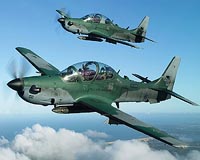| . |  |
. |
Beijing (AFP) Feb 1, 2010 China could block new UN sanctions on Iran and hinder progress on other key areas of international diplomacy such as North Korea in retaliation for US weapons sales to Taiwan, analysts said Monday. With China-US ties already strained and a dispute over Google ongoing, a threat by Beijing to punish US firms involved in the 6.4-billion-dollar deal with Taipei shows it feels empowered to stand up to Washington, they say. That new boldness stems from China's economic might, and could lead to even more difficulties in the future in the US-China relationship, which US President Barack Obama has said will shape the 21st century, they added. "On Iran... there's more scope for them to play a spoiler role, and not helping the Americans as much as the Americans would like," said Brian Bridges, head of the political science department at Hong Kong's Lingnan University. Washington has for months sought to convince Russia and China to back a tougher line against the Islamic republic over its nuclear programme and support from Beijing at the United Nations is crucial for further sanctions. Jing-dong Yuan, a non-proliferation expert at the Monterey Institute of International Studies in California, was even more blunt, saying the Taiwan deal meant the US "should forget about" Chinese support to punish Iran. "From Beijing's perspective, it seems Washington always asks for China's cooperation -- and increasingly demands that China do things the American way -- from climate change to issues concerning Iran and North Korea," he said. "But China's requests on what it considers as vital national interest (such as the Taiwan issue) fall on deaf ears." Washington is the leading arms supplier to self-ruled Taiwan, even though it switched diplomatic recognition from Taipei to Beijing in 1979, and is obliged by US law to help the island defend itself. Beijing said Saturday it would suspend military contacts with the United States over the deal with Taiwan, which it sees as a breakaway part of its territory. China has hundreds of missiles targeting the island. The last package of US missiles, helicopters and other weaponry for Taiwan, announced under Obama's predecessor George W. Bush in October 2008, also led China to temporarily cut off military relations with the United States. But this time, Beijing has warned the repercussions could be far more extensive. "A message has to be sent loud and clear: If the US shows no respect to China's core interests, it cannot expect cooperation from China on a wide range of major regional and international issues," the China Daily said Monday. US Secretary of State Hillary Clinton on Friday put pressure on China to join calls for new sanctions against Iran -- something Beijing, a veto-wielding member of the UN Security Council, has so far been unwilling to do. Xu Tiebing, an expert on international relations at the Communication University of China in Beijing, said China was reluctant to antagonise Iran due to its oil interests in the Islamic republic. But analysts said the potential impact on long-stalled six-party negotiations aimed at ending North Korea's nuclear programme, which are hosted by China and where Chinese cooperation is again crucial, were less clear-cut. "The Chinese have very special needs in the North Korean situation because North Korea is right next to them geographically, and they have been trying behind the scenes to push the process forward," Bridges said. "So the Chinese are not going to add more rhetoric on the Korean issue." The intensity of China's reaction to the Taiwan deal surprised some analysts, but they said such confidence stemmed from Beijing's economic might, and its position as the biggest holder of US government debt. "Since the financial crisis, China's strength has increased as has its boldness, so the intensity of its counterattacks is even stronger," Xu said. Bridges said the Taiwan deal would not be the last obstacle on the road to closer ties, saying: "This is not necessarily an obvious, friendly partnership. There are always going to be difficulties within this relationship."
Share This Article With Planet Earth
Related Links Learn about the Superpowers of the 21st Century at SpaceWar.com Learn about nuclear weapons doctrine and defense at SpaceWar.com
 Ascendant Brazil seeks Latin pre-eminence
Ascendant Brazil seeks Latin pre-eminenceRio De Janeiro (UPI) Jan 29, 2009 Brazil is gaining ascendancy in Latin America faster than anticipated by its neighbors and is poised to claim its pre-eminence on the continent on the basis of its geographical mass and financial prowess. This week Brazil demonstrated its financial clout by signing agreements to buy $10 billion of International Monetary Fund notes. A longtime and frequent borrower from the IMF, it was t ... read more |
|
| The content herein, unless otherwise known to be public domain, are Copyright 1995-2010 - SpaceDaily. AFP and UPI Wire Stories are copyright Agence France-Presse and United Press International. ESA Portal Reports are copyright European Space Agency. All NASA sourced material is public domain. Additional copyrights may apply in whole or part to other bona fide parties. Advertising does not imply endorsement,agreement or approval of any opinions, statements or information provided by SpaceDaily on any Web page published or hosted by SpaceDaily. Privacy Statement |